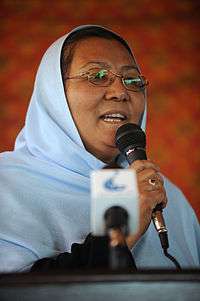Habiba Sarābi
| Habiba Sarābi حبیبه سرابی | |
|---|---|
 Habiba Sarabi as Governor of Bamyan in April 2011 | |
| Governor of Bamyan Province | |
|
In office 23 March 2005 – 14 October 2013 | |
| Preceded by | Mohammad Rahim Aliyar |
| Succeeded by | Ghulam Ali Wahdat |
| 2nd Minister of Women's Affairs | |
|
In office July 2002 – December 2004 | |
| Preceded by | Sima Samar |
| Succeeded by | Massouda Jalal |
| Personal details | |
| Born |
Habiba 1956 (age 61–62) Sarāb, Jaghatu District, Ghazni Province, Afghanistan |
| Nationality |
|
| Political party | Truth and Justice |
| Children | 3 |
| Father | Abdul Hamid |
| Ethnicity | Hazara |
Dr. Habiba Sarabi (Dari: حبیبه سرابی) (born 1956) is a hematologist, politician, and reformer of the post-Taliban reconstruction of Afghanistan. In 2005, she was appointed as Governor of Bamyan Province by President Hamid Karzai, which made her the first Afghan woman to become a governor of any province in the country. She previously served as Afghanistan's Minister of Women's Affairs as well as Minister of Culture and Education. Sarabi has been instrumental in promoting women's rights and representation and environment issues. She belongs to the ethnic Hazara people of Afghanistan. Her last name is sometimes spelled Sarobi.
Biography
Sarābi was born in Sarāb, Ghazni Province[1] and spent her youth traveling around the country with her father. She later moved to Kabul to attend high school and study medicine at university. After graduating in 1987, she was awarded a fellowship by the World Health Organization and moved to India to complete her studies in hematology.
During the Taliban rule in Afghanistan, Dr. Sarabi and her children fled to Peshawar, Pakistan, but returned frequently in secret. Her husband stayed behind in Kabul to care for his family. She also worked underground as a teacher for girls, both secretly in Afghanistan and in refugee camps in Pakistan for Afghan refugees. In 1998, she joined the Afghan Institute of Learning and eventually became the General Manager of the entire organization. She was also the Vice President of Humanitarian Assistance for the Women and Children of Afghanistan.
As governor, Sarabi has announced one of her focuses will be on tourism as a source of income. The province has historically been a source of Buddhist culture and was the location of the Buddhas of Bamiyan, the two ancient statues destroyed by the Taliban prior to the U.S. invasion of Afghanistan. However, Bamiyan remains one of the poorest and most under-developed provinces of Afghanistan, with a litany of problems including high rates of illiteracy and poverty.
In 2008 Time magazine included her in its list of Heroes of the Environment (2008), partly for her work in establishing the Band-e Amir National Park of Afghanistan in Bamiyan.[2] In 2013, she won the Ramon Magsaysay Award.
On 8 March 2018, International Women's Day, she delivered a statement to the UN Security Council during the Open Debate on the United Nations Mission in Afghanistan.
See also
- List of Hazara people
- Azra Jafari, Afghanistan's first female mayor
References
- ↑ W. Adamec, Ludwig (2012). Historical Dictionary of Afghanistan. Scarecrow Press. p. 399. ISBN 9780810878150.
- ↑ Time Magazine October 6th 2008. See Time Magazine web page Archived August 26, 2013, at the Wayback Machine.
External links
| Wikimedia Commons has media related to Habiba Sarābi. |
- Biography on the Global Fund website
- Biography on Salon.com
- BBC article on her appointment as governor
- BBC article on her impending appointment
- NPR Report: Female Governor Fights Lonely Battle in Afghanistan
- EurasiaNet: Afghanistan's First Female Governor Strives to Change Attitudes and Habits
| Preceded by Mohammad Rahim Aliyar |
Governor of Bamyan, Afghanistan 2005–Present |
Succeeded by [Incumbent] |
| Preceded by Sima Samar title=Minister of Women's Affairs, Afghanistan |
{{{title}}} 2002–2004 |
Succeeded by Massouda Jalal |